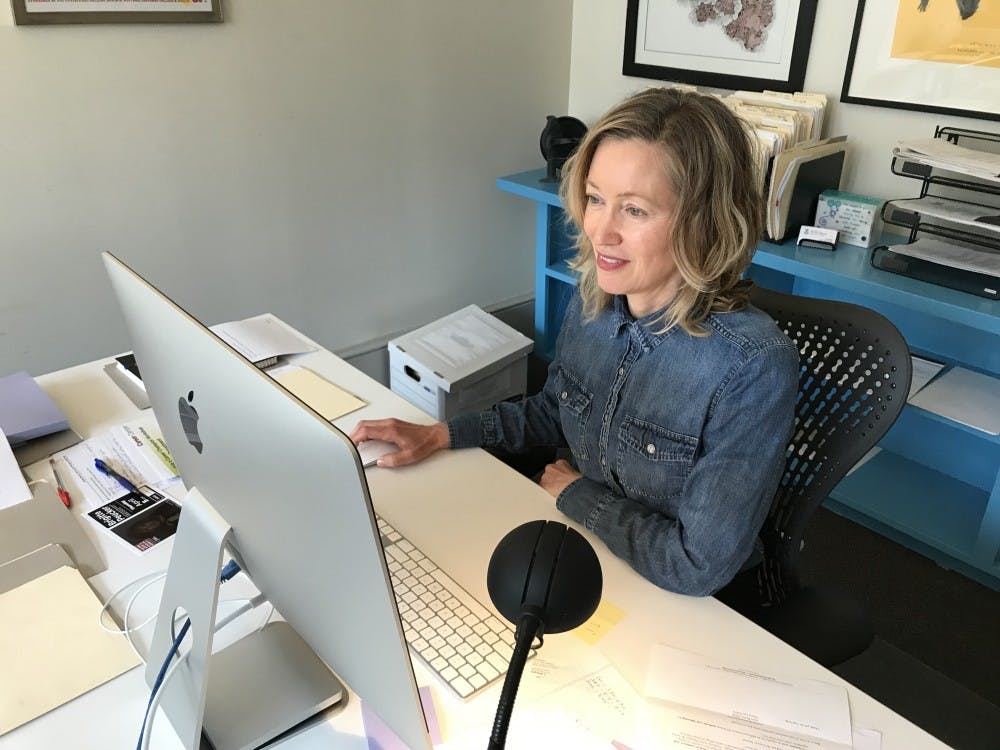Laura Kissel was 7 years old when she first asked her parents for a camera, and she was met with a resounding no. At the age of 12, she borrowed her father’s camera on vacation and never gave it back. Since then, she has become a documentary filmmaker and uses her work to inspire people to think more deeply about real world problems.
“My favorite thing about the career is probably the way in which you can use media production to engage other people in conversation about really important issues in their lives and in society,” Kissel said.
Kissel came to USC 20 years ago in 1999 as a professor and is now the director of the School of Visual Art and Design. During her time at USC, she has pursued her passions in documentary film and satisfied her curiosity about the world around her.
“The camera for me is a mode of inquiry,” Kissel said. “It’s a way to engage the world and engage questions and try to understand complex human situations in a different kind of way.”
This year, Kissel has received the 2018 Distinguished Research Service Award, a new honor for faculty who have shown an outstanding dedication to helping service programs throughout the university. Fifth-year media arts and media studies student Leslie Leonard has worked with Kissel in an independent study and noted Kissel’s devotion to service to help others and skill in the documentary filmmaking field.
“She always wants to help people and help them make those connections where they can do great things,” Leonard said. “She believes in what I’m doing and wants the best for me in the future.”
Kissel has served as a mentor for third-year visual communications student Kristin Stitzlein’s Magellan research project, and she even helped her figure out what major she wanted to pursue.
“She just definitely carves out time to be able to pour into other people, and I think that’s a really special thing,” Stitzlein said. “I can’t say enough good things about her.”
It felt really good for Kissel to be recognized for her work, and in the future she looks forward to helping the visual art and design school and the different programs that she works with to enhance students’ experience.
“I just believe so much in the mission of the office of undergraduate research,” said Kissel. “I take mentoring very seriously.”
Kissel attributed a lot of her personality to her family and the way that her parents raised her to care about others. Growing up in a family with a brother who had a disability, Kissel developed a different perspective of people who were different from her than what she saw in society around her. This translates into her documentaries and her approach to how she works.
“I was in this family that was questioning the dominant paradigm when it came to valuing human life, and so that, I’m sure, shaped me and helped me to see and understand and confront differences in other kinds of ways,” Kissel said. “It made me much more open to seeing and understanding other people’s marginalizations, due to their perceived ‘difference,' whether that be gender, race, class, what have you.”
Kissel also emphasizes the importance of supporting women in the film industry.
“It’s really important to encourage young women that they can do the work, and they do have a place and they should work really hard for that place,” Kissel said. “And if I can support them in that work, then it's something that feels really meaningful to be able to do.”
The Emmy-nominated documentary filmmaker is determined to learn more about the world around her and transfer this knowledge to others.
“When you meet other people whose circumstances are not as good as your own … it forces you to really think more deeply about the way the world works. And so meeting other people who are different than you are, really, if you’re sensitive to learning from that, you can confront this perception and you can change maybe your own attitudes," Kissel said. "Then hopefully through that engagement with someone, you can learn something that you can then pass onto others. And, of course, I try to pass that message or that experience on through filmmaking and sometimes that reaches people.”
Over the past 20 years, Kissel has grown with the industry and finds the time that she spends with students and the time she spends making films very valuable.
“Documentary has just continued to facilitate my own questioning as I continue to grow as a human,” Kissel said. “As I get older too, I realize there’s only so much time. And so, I don’t want to spend it in frivolous ways.”

